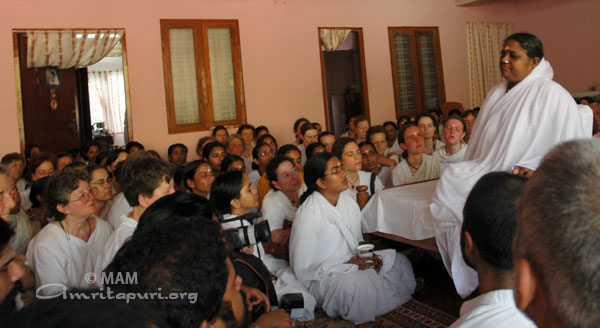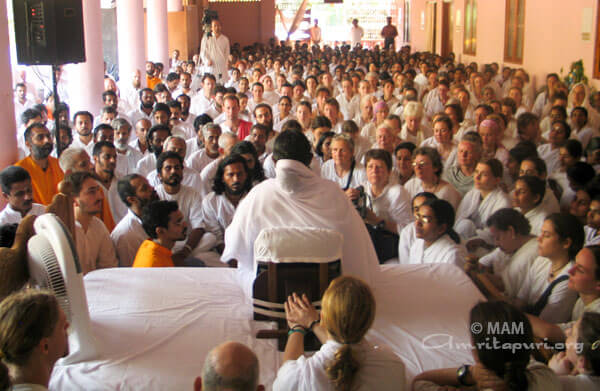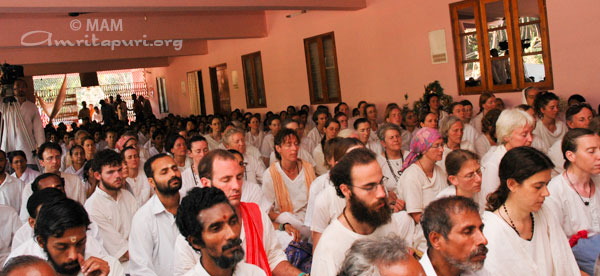8 February 2006 —Talassery, Kerala – Bharata Yatra 2006
At their request, Amma has given many of her devotees “spiritual names”—typically Sanskrit or Sanskrit-derived words that indicate divine qualities, spiritual principles or are names of gods or saints in themselves. For example, Vinaya (a feminine name meaning “humility”), Mahesh (a name for Shiva, meaning “Great Lord”) or Chaitanya (“consciousness”)… Over the past 35 years or so, Amma has given thousands of people—from all countries and of all ages—such names.

At the beginning of the 2006 Bharata Yatra, Amma was spending some time with all the brahmacharis, brahmacharinis and devotees who would be accompanying her across India for the next two months, and Steve, an American devotee in his mid-twenties, took the opportunity to ask Amma what a spiritual name is all about.
“I was hoping Amma might tell me what the benefit and significance of having a spiritual name is?” he asked.
“Amma doesn’t force you to change your names,” Amma said. “You come to Amma and ask her to give you one. In India it is the tradition for parents to take their babies to ashrams and ask the Guru there to name them.
“Just by getting a name, you won’t change. The change has to happen from within. At present we are strangers to our own Self. We need to awaken from that state.”

Amma then asked Steve, “What would your expectation be in receiving a spiritual name?”
“I would expect that it would be something that would represent my personality and that it would be something that would grow within me as people called me that name,” he answered.
Smiling at the young man, Amma said, “We are born nameless. Then our mother and father give us a name and we become very attached to it. Amma is not interested in changing your names. Your parents will be hurt if you forsake those names. But since you ask, I give them to you. Just by changing our name or taking up new clothes [i.e. the clothing of an ashramites], nothing will change. Change must come from within.”
Amma then said that, on the other hand, if we reflect we will realize that we have had many births, many mothers and fathers, and many names. “Think, ‘What is eternal?’ Maybe in our past life, we were their parents and it was we who named them. These names are not eternal.”

Amma then said that taking a name from a Guru is like taking a new birth. “This doesn’t mean that you have to actually die. In truth, death is taking place each and every moment.” (Amma then said, kind of as an aside, that for her, death is just another experience, like taking a bath, changing your clothes or brushing your teeth.) She then continued, “When Amma gives you a name, it is like taking a new birth. You become identified with it and it reminds you of your True Self. If you are focused on it, the name can really help you to realize your true nature.”
Amma then explained how in the world everyone is attached to his name, fame and position in society. In the name of freedom, she said, people have no problem killing or torturing one another for money or pleasure. Everyone wants to be the boss; no one wants to accept anyone else’s ideas or opinions, she said. “But in spiritual life we are trying to go beyond all this. Taking a new name can be a step in this direction. Now we are trying to include others in our prayers. Now we are trying to see others in our own Self and our Self in others.”
Amma then shared the experience of one who has gone beyond and realized his identity with the Supreme Self. “A Guru needs nothing from this world. He lives as if in a glass case. He can see both the world outside as well as his own Self. He sees the world in his Self, and his Self in the world. But he remains totally detached.”
Amma reiterated, “It is one sun that reflects in a thousands different pots. In a similar way, once you realize your identity with the supreme consciousness, you transcend all names. But, first, the ahamkara [the notion of “I” and “mine”] must go.
“In order to transcend the ego, we must become humble. Only when a seed goes down into the soil and breaks open does it merge into the soil and become a tree. As long as the ego is there, there is no hope. A spiritual name helps to remind us that we are, in fact, the Paramatman [Supreme Self].”
Amma then explained some other ways in which having a spiritual name can help one striving on the spiritual path: “When you hear someone call the name, you will think of Amma, because she gave it to you. Also, as you hear the name constantly, it makes you constantly inquire to see if you are living up to all it signifies.”
Such names also help us maintain awareness of our dharma, Amma said: “When you get married, you exchange rings. The ring reminds you of your beloved. And if later you start becoming attracted to someone else, your ring serves to keep you aware of your dharma. A spiritual name can be a similar type of reminder.”
“You also have a responsibility to live up to your dharma,” Amma told her children. But she then added that she, of course, will help them to do so.
“All names and forms have a purpose in the world. They have a meaning. They have a dharma,” Amma said. She then gave the example of how someone illegally cutting down trees in a forest might not listen if a man approaches him and tells him to stop. But if that man returns in a police uniform, surely he will listen.
“In the end, we must go beyond all names and forms,” Amma said. “But the name is quite helpful in getting us to this stage. If a thorn gets stuck in our foot, we take another thorn and use it to pick it out. Venom itself is used as an antidote for poison.”
*****
29 March, Kolkata
In Kolkata, Amma called all those who had been traveling with her for the past two months for her darshan. When Steve came before Amma, he had another question. “Amma, can I have a name?”
Now, Steve is known as “Yati,” meaning “one who strives for realization.”
—Sakshi
